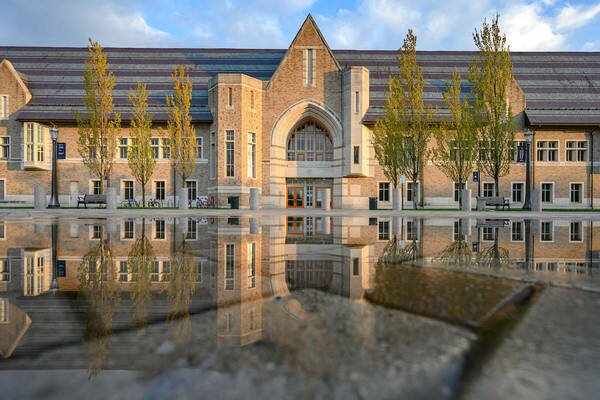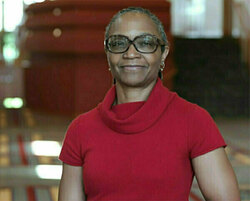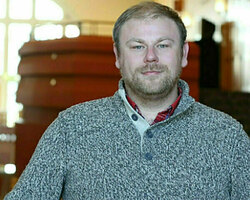
"All cultures use the arts as a form of expression, but there haven’t been equal spotlights in their presentation.” With these words, staff at the DeBartolo Performing Arts Center set forth a challenge to themselves and a commitment to the campus and South Bend communities.
The center’s Statement on Diversity, Equity, Inclusion and Accessibility (DEIA), developed in 2022, outlines the ways in which staff plan to work to unify, respond, engage, and make the center more inclusive for all. DPAC employees Leigh Hayden, director of marketing and communications, and Ricky Herbst, cinema programming director, are among about a dozen of the center’s 24 employees who volunteered to serve on the DEIA committee.
Hayden and Herbst say the Statement on DEIA has helped increase awareness and a sense of accountability for staff as they explore ways the center can be more diverse and inclusive in its operations, artistic practices, and community relations. “We’ve been able to build really strong, cross-functional, cross-department, cross-silo teams,” Hayden said. The result is a 360-degree view of programming that is “genuine and holistically viewed, seen, and conceived.

But there’s a lot that’s new and different as well – particularly as it relates to the center’s function as a community space.
There is much about DPAC that will still be familiar to longtime patrons and partners. The center remains the University’s leading presenter of world-class artistic programming. And it continues to function as an academic space to enhance the scholarship, teaching, and practice of the performing and cinematic arts.
In June, DPAC hosted its first Juneteenth Celebration and Resource Fair, bringing students, faculty, staff, and South Bend-area residents together to commemorate Freedom Day and unite as a community. Herbst was one of the organizers of the event, and he credited DPAC’s community advisory board – consisting of South Bend-area artists, activists, educators, entrepreneurs, and youth leaders – with helping to make the event a success. In particular, Latorya Greene, president of the Indiana Black Expo’s South Bend chapter, provided invaluable knowledge and guidance regarding her chapter’s previous community events.
“Summertime is when we imagine campus as fallow or put away for the season, but it’s when kids are free from school. It’s when you’re able to get out, and when people have increased mobility through various forms. And it’s a perfect time to strengthen campus community connections, yet we don't really see it as much,” Herbst said.

Inviting other organizations to take part allowed attendees and presenters alike to better network, share information, and discover similar interests. Working cooperatively is a way for all involved to “lift up,” Herbst noted. DPAC is planning to host the event again in 2024. “That’s what we heard, ‘You need to do this again and continue the momentum.’”
The Office of Institutional Transformation was one of many partners on the Juneteenth Celebration. Eve Kelly, associate director of strategic initiatives and senior advisor to the vice president for institutional transformation, said the event brought campus and the community together in ways she’d never seen before.
“This year’s inaugural Juneteenth event was my first experience at Notre Dame where I did not feel a divide between Notre Dame and the city of South Bend. When I stepped out onto the lawn that day, it simply felt like a community coming together in celebration,” said Kelly, a member of the South Bend arts scene and DPAC’s community advisory board. “It was a beautiful thing to see, and I am in hopeful anticipation of future collaboration that will foster this sense of unity between the University and its neighbors.”

This year the center also launched its Presenting Series’ Cultural Collective, which includes musicians Lalo Cura, the Orange Moon artist showcase, and ASHE: A Celebration of Voices. The series is a way to “support the equitable development of artistic talent that’s in South Bend,” Hayden explained. “It’s unexpected. New people, new patrons, new visitors, new guests are finding their way here, and they’re finding that there is something for them here at DPAC.”
Another area the DEIA committee identified as needing renewed attention was making it easier for people with disabilities to enjoy the arts. Kevin Krizmanich, cinema production manager, took the lead on finding solutions for those with impaired hearing. He researched equipment, talked to other venues about their experiences, and met with patrons to better understand their needs. The center now prominently promotes its services to improve accessibility, including assistive listening devices, courtesy wheelchairs, large-print programs, and American Sign Language interpretation.
For Herbst, the biggest lesson learned has been about letting go of control and preconceived notions when expanding the center’s offerings in this way. Letting go creates room for diversity and inclusion to flourish. “That process of loosening up and allowing space for missteps or for people to insert their own ideas is crucial to what allowed us to shift,” he said.
Hayden encourages others across campus to examine how they can approach their work in new ways to better serve diverse communities, whether or not they have a formal leadership role.
“You don’t have to wait to be granted or bestowed a seat at the table,” she said. “Everyone has a voice. Everyone has the power to speak up about the things they see that don’t serve their unit, team, organization, or the Notre Dame mission. And more people realize that, the better things will be in a lot of places and spaces.”
Editor's Note: This is the first in a DEI Practitioner Spotlight series, featuring the work of professionals and experts across the University who are working to advance DEI initiatives within their home units and departments. If you have a story idea about a person or program, please email the Office of Institutional Transformation at transformation@nd.edu.
Originally published by at diversity.nd.edu on October 18, 2023.